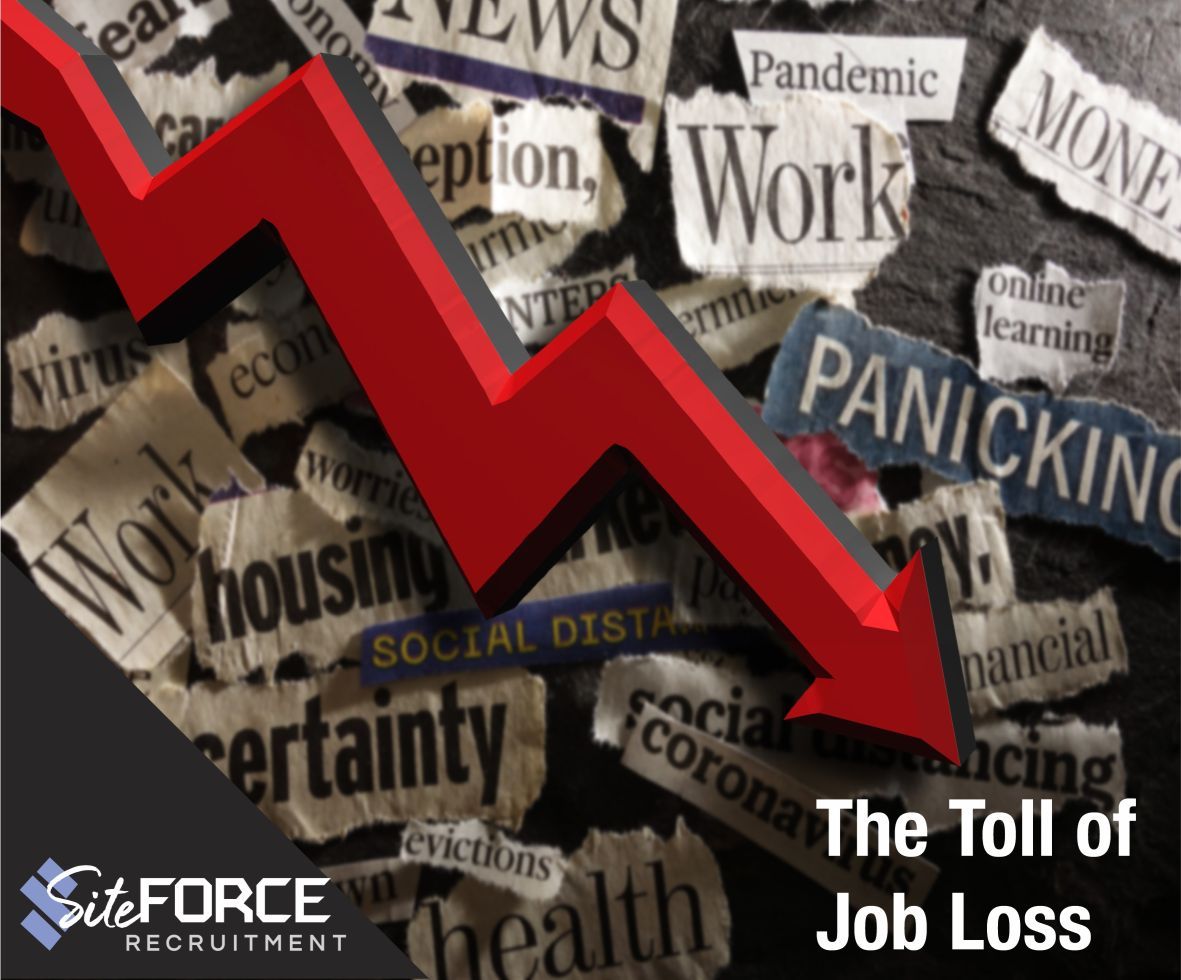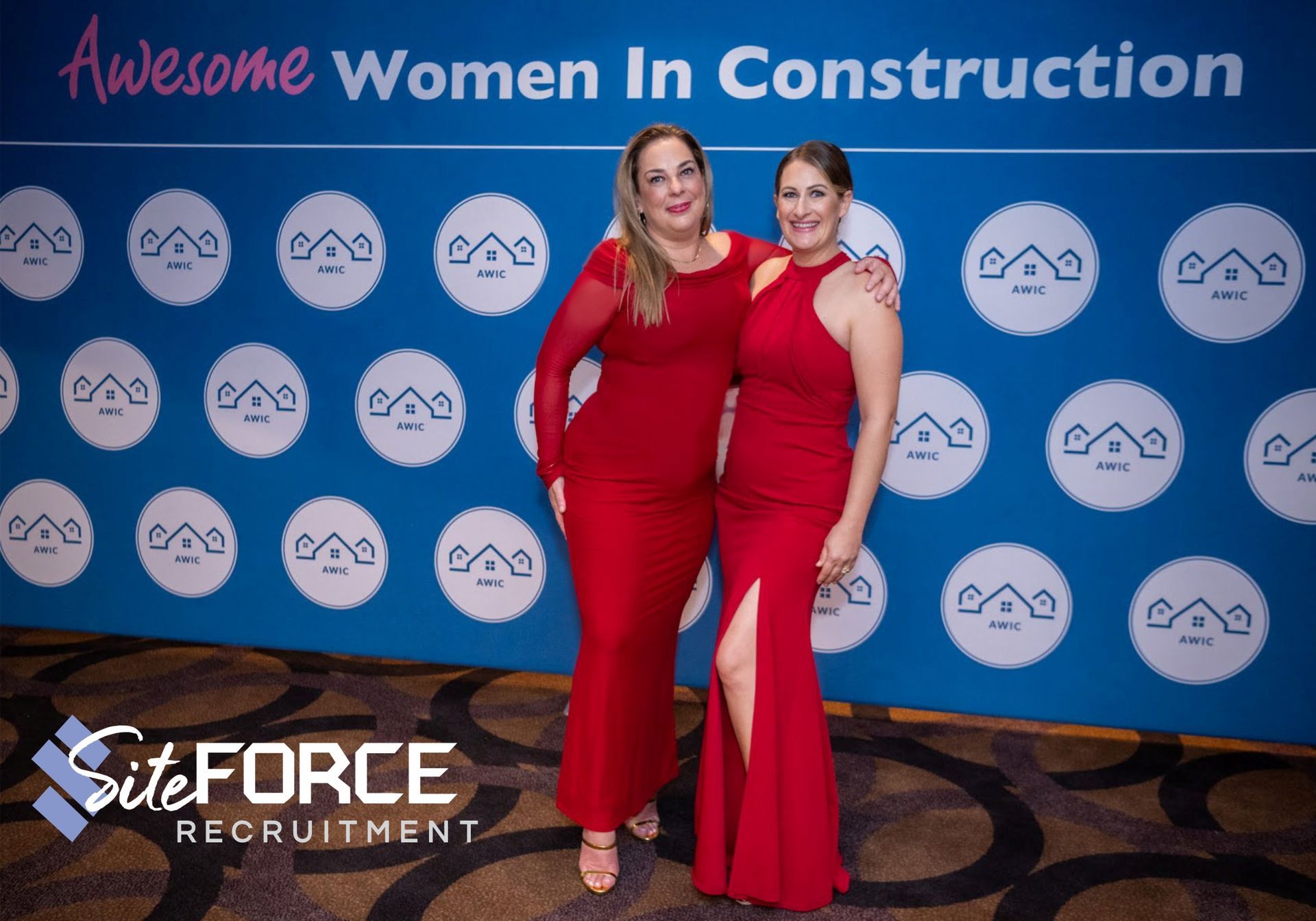The Toll of Job Loss
Identifying and Helping on the Slippery Slide with Nathan Bishop from The Outdoor Hub

Research on unemployment shows that losing one's job is detrimental to mental health – and often physical health – even without serious financial strain. Work provides us time structure; it provides us identity; it provides us purpose, and also provides social interactions with others. If you lose all that, it can create a lot of difficulties for people.
The bottom line is people need to eat, they need to have shelter, and they need to have health care. People can lose their jobs through poor mental health, and poor mental health can prevent people gaining jobs. People tend to blame themselves for losing their jobs, and unemployment can create a stigma. Explaining gaps in employment can be a challenge.
So how do we help?
How can we change attitudes and promote a more accurate narrative for those that have lost their jobs?
In this interview between Chantal Penny of SiteForce Recruitment with Nathan Bishop from The Outdoor Hub, share their insights and experience with job loss, homelessness, addiction and the housing crisis and some tips for both employers and employees.
Chantal: What are you finding the biggest trend now with people and who you help with your "Reach Out For a Thousand" campaign?
Nathan: There is such a wide variety of people suffering at the moment, from loss of jobs, to the housing crisis, displaced persons, mental illness, and we are doing as much as we can in the community to feed and clothe people.
Chantal: Where do you think the gap is – is it trying to get them back into employment, stigmas around people with mental illness and not being able to get a job?
Nathan: I think it's pretty difficult for people without access to bedding and a shower to be presentable for an interview, let alone a job application process. They might be under-skilled or lack basic English communications, and it is difficult for them to get access to computers and get posts about a job, and then you've got drug and alcohol addiction added as well.
Chantal: For me, I've seen this with numerous staff over the years, where they feel a stigma and feel uncomfortable talking about their situation. I've tried to help them, for example: Can they work three days a week? We're working on wage increases to ease them back into it until they're comfortable again. How do we make sure that we provide a supportive environment, though, so that they don't feel like they have to get back on the drink and go back down the rabbit hole again? I'm sure we can create a culture that is aware and doesn't focus on "having a drink" to be accepted, because they can't drink. A big thing for me is creating a culture that supports others, where you are allowed to have feelings, and they're allowed to speak up without being treated coldly. I think we need to start doing that more, thinking about mental health in the workplace, as the next generation coming through – that's their trend!
Nathan: I think there are a lot of companies doing it now where there is a big push for mental health safety, not just workers' safety. The change of culture needs to come from the top with more preventative practices. Like you said, it's becoming more and more difficult for mental health issues, there's more global issues, pandemics, and wars, and all this stuff is affecting their work. These days, you have to educate and train people to figure out how to provide a safe and inclusive environment for the disabled and impaired.
Chantal: And comfortable! Comfortable to speak up without the fear of losing their job, so we don't get people lying about what the actual issue is. Because sometimes it is "Oh, I'm just sick", whereas they struggle with mental illness and need their medications adjusted. This is a major thing, that actually has to happen and sometimes I know from experience that it can take weeks; it's not an overnight thing; it's a process. I think it is about education – where would you go to reach out? Does the employer have staff trained to handle these situations, or where do you go?
Nathan: Is it money or policy? Particularly in construction, you've got deadlines and deliveries.
Chantal: I feel that is the problem why it has taken us so long to adjust the culture, because everyone has concerns about small margins; we need this exact label on site all the time, and if we don't have that, why do we want to pull them away for an hour to worry about mental health.
Nathan: Yes, exactly. Though I think it is trending now in terms of good mental health, we're finally realising that they need more support, and the health and quality of your team is ultimately what produces good outcomes. As a business owner, you need to invest in those areas.
Chantal: Yes, for me, I'm seeing that one of the biggest things people are actually looking for isn't just money; it's culture. Everyone wants to work for a company that has a supportive culture, and the generations coming into the workforce now have different expectations. I just watched a documentary on this DJ named "Khalid" who talks about how music has changed and how his generation sees the world. It clicked with me, that this is what we should be talking about. Rather than "this generation is lazy", we need understanding and to find a balance.
Nathan: One hundred per cent! I think it's just like anything; it's understanding. It's that balance of being able to guide, discipline and have rules in place. Whether it's giving the apprentice a hard time, playing games on them, making fun of them, just making their life crap, and they start to get anxiety.
Chantal: And, it's not working anymore.
Nathan: Well, it's never really worked. To be honest, to get the best results at any level, it requires a good understanding and how to get the best out of them, not force a result, but a good result that improves productivity and connection, and that becomes a part of your company and culture, you lead the team, train your trainers and team leaders.
Chantal: You mean lead from the front, lead by example, and actually take the time to explain things to them, instead of trying to overtalk or outtalk people.
Nathan: Like I said, construction is one of the worst mental spaces to be in, whether you're an apprentice or business owner or anywhere in between. And it can also be the best. Because it's fun, anywhere you're building things; it's fun. That's why people are drawn into construction, because they don't sit well in classrooms, looking at a board or computer. So that draws them into that space, and they are also drawn into a cycle of mental illness or mental wellness of a pressured industry.
Chantal: And then they find it if is not a supportive culture they can't speak up, like having those side conversations with the foreman, some toolbox meeting, some sort of procedure in place, that someone is not behaving their usual self, there's no stopping and asking them if they're ok. I know a few examples myself, where people feel that it is something they have to put up with, there is still a stigma about bullying, victim shaming, and being seen as weak. Performance suffers, and job losses happen.
Nathan: Like, one of my friends, he owns a building company and just recently lost it and tried to commit suicide. The reality is that depression and suicide is a big issue with men and boys.
Chantal: Yes, I've know many people personally who have committed suicide. What people don't realise is that people who commit suicide don't wake up one day and go, "Today, I'm going to commit suicide". They've probably tried some damaging behaviour beforehand. Perhaps no one noticed that they haven't spoken about what they are feeling; they feel like they've lost hope and nothing is left for them. It makes me sad to think they are in that headspace and probably would have been there for a long time.
Chantal: For example, I have a guy working for me, and he went from being a really good worker, handing in his time sheet on time, and everything was great. Then he stopped handing his timesheet on time, then got mad when his pay couldn't be made on time, and he started getting angry and impatient, because he was emotionally overloaded. Instead of wiping him off, I took the time to call him and ask, "What’s happening” and he went “, What do you mean”. As we discussed what was going on, I told him I didn’t need to know everything, but I needed to know what was going on, as this was not you. The shocking thing, and what I am grateful for, is he turned around and said to me, “You know, not one person has asked me, apart from you”. So that means none of his friends, no family, no co-workers. And I’d seen him deteriorate over a couple of weeks. So, it is not an overnight thing; there are a couple of weeks where he’s turning up to work, maybe late, not in the best mood, and not focusing. You see it in someone’s behaviour when they change.
Nathan: I think we have about 7000 thoughts a day on average, and a majority of these are negative thoughts or neutral, so it can be a slippery slide into a negative focus.
Chantal: It’s so crazy saying that. A bit thing for me was to do meditations to change those, because I noticed how I speak to myself, and it can be disgusting. And it can be many reasons, including our environment. I tried positive meditation for 30 days, and that’s how I got around it. I have an affirmation app that goes off five times a day, saying, “You’re beautiful, You’re Yourself, You Deserve This”, and things like that to remind me to be aware of those negative thoughts. You have to cast out those negative thoughts.
Nathan: That’s fine, and there are so many tools to help make people aware of what thoughts they are focusing on as well as people they can reach out to.
Chantal: And feel comfortable about it.
Nathan: Yes, that’s right. You know, in a big company, talking to an HR person isn’t very easy but they are usually trained. Whereas in a small company where there is no HR person, you’re dealing either with your boss, the manager, foreman or team, and you don’t really want to talk to them about feeling weak or interior or scared or ashamed, and they don’t often have any training to handle this.
Chantal: Yes, it is often met with “harden up”, “get on with it”, “are you a man or what”, “raise your confidence”.
Nathan: That’s right, there can be no safe place to work those feelings and emotions. Psychologists can be very expensive, but what other options are there is not well known. It is getting better, but the workplace also needs to support access. We need to break the cycle that this does not deserve focus and time.
Chantal: It’s like going to the gym. It is ok to put “me time” into going to the gym, and we need to make it ok to put “me time” into making sure we are mentally fit.
Nathan: I think it is about self-skills, self-awareness, being aware of others around you and we’re generally not taught that. That helps you in a relationship, in a workplace, as a parent, as a friend, or as a son and daughter.
Chantal: I think we need to see an evolution in construction, some forward thinking. You know some of our leaders now started as apprentices as such a young age, and the industry is changing.
Nathan: We have started a thing called “HelpHand”, which is like a HR version of “R U OK? It’s like a meeting with Uncle Nathan.
Chantal: I love that.
Nathan: Like, let’s forget the formalities; it needs to be a safe, private space that you can just say what is happening. Because your staff members can carry worry, depression, anxiety and stress. It can be anything from finances to other things, and it affects their work.
Chantal: Create safe space.
Nathan: Yes, and nurture the relationship. I’d say, “we’ve got you for 12 months, 12 years, whatever, and during that process, we’re going to make sure you are ok. Here’s some tools; here’s some resources, if you need financial advice, if you need a counsellor, or if you just want to have a chat.
Chantal: That is amazing; you’ve just hit the hammer on the head. Those struggles and sticking points that I’ve found with most of my crews. They may not know how to go about getting a house. We do toolbox meetings and start educating them and how to get through things, including things like what if they hurt themselves. In my experience, most don’t know that, and they just get into another struggle of not having information, not knowing where to go. This turns into depression and mental illness, like not knowing where to turn to. So there are many things we can do to kind of box that up from here.
Nathan: I think if this can be taught at school or during their apprenticeship, where you have a few weeks or months of awareness, mental health fitness, finances, taxes, how you get a home loan, budgets, agreements, who and where to go to for support and help.
Chantal: And in our industry, safety, insurance, work output, how to handle delays on projects. Like what is happening now with supply chain issues. I have some clients that have been personally affected, and my heart goes out to them. I’ve been talking to a lot in the industry about builders going bust, and on the flip side, at least we might finally have a marketplace where people tender properly, and they aren’t trying to screw out or price out the market. Not being run by the big boys all the time on 5% margins, that is just not sustainable and the ripple effect of the pressures on people can cause mental illness.
Nathan: You know, nine times out of ten, what you suffer can become a testimony to help someone else.
Chantal: Doesn’t it? And that makes you stronger, and you feel more accomplished, something you’ve won. Like “I beat this”.
Nathan: 100%. This is why we need to change the culture and give people credit, be like, good on you for getting through that, good on you for giving up drugs, for changing your life. It’s actually a big testament to how strong a person actually is. What I’ve noticed is, the more you make people feel like they actually have a connection to everyone else, the less likely they are to relapse, go back or whatever.
Chantal: Like celebrating those things.
Nathan: Yes, companies typically will celebrate financial success, milestones, goals, awards, industry awards, rather than celebrating “Hey, Jimmy is off his anxiety meds; let’s give him a round of applause”. It’s what the company champions; it’s where the focus is. People.
Chantal: And why can’t we do both, though?
Nathan: You should be doing both. That’s why we do things like “HelpHand”, and we see the fruit in investing in people. So, we would rather have a healthy, successful team corporately to take the company where it needs to go, rather than having that at the expense of people. Does that make sense?
Chantal: It makes perfect sense. I was having this conversation the other day talking about the culture for a prospective candidate that they were experiencing in a particular company. They’re not matching the culture, and that doesn’t make them a bad person. It means many things: they’re frustrated, not being paid properly for their effort and expectations, or not being supported. You don’t write people off. The key is understanding and ensuring a cohesive relationship between the business and candidates to have a healthy environment. I feel if I’m not managing someone correctly, if someone is not being successful and they have all the right personality traits and skills, it’s not them. It’s me. I need to look at what is lacking in my communication and what I am providing them.
Nathan: Small businesses, most of them, hire people they feel they like. In big companies, it is usually a fit to a checklist. It’s because they’re not recruiting experts.
Chantal: It is really having an understanding of not only the job, like a machine operator, what kind of machine are they operating, what size, how much experience are you expecting them to have. But also how who you are, and how they think. I still believe the reason I am so successful at what I do is because, I literally get people saying “you can’t talk to people like that”, but they love it because I’m talking their language, making it easy for them, they don’t have to double think, and they’re not getting confused. I am literally saying, “this is your job, this is why you are being paid this amount, this is what the market rate is, if I’m not paying this rate it is because your experience is not up to standard, this is what you need to do to get to that standard, what are you thinking, what are your goals, what is your end-game and how can I help you get there”.
Nathan: It is actually assisting them.
Chantal: I want results, and I know how to get the best from people. Bottom line, it is about caring.
Related articles:
The Secret Sauce of Matchmaking: Chantal Penny, The Human Matchmaker
The ‘Great Exhaustion’ and Mental Health
Wired & Over-Tired: Team Check-In Tips & Stress Indicators
How to Explain Gaps In Your Employment – Turning a Negative into a Positive
SiteForce Recruitment specialise in labour-hire and permanent recruitment in the construction industry. We are committed to valuing people, safety and well-being, collaboration, trust and of course – results!
CONNECT with us via our contact page or bookings links on our website if you are looking to recruit for, get your dream job, or join our amazing labour force team.
#siteforcerecruitment #recruitment #labourhire #brisbanejobs











